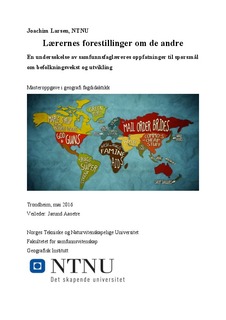Lærernes forestillinger om de andre : en undersøkelse av samfunnsfaglæreres oppfatninger til spørsmål om befolkningsvekst og utvikling
Master thesis
Permanent lenke
http://hdl.handle.net/11250/2449717Utgivelsesdato
2016Metadata
Vis full innførselSamlinger
- Institutt for geografi [1119]
Sammendrag
This thesis is the second part of a research project named “The conception of the others” following up its predecessor, which dealt with students’ attitude towards the population in developing countries, with a new focus on the teachers in this context. We live in a world that is changing. The global population is growing rapidly, especially in Third World-countries. As a result, new questions arise concerning the subjects Population and Development. Questions that not only relate to the well-known fact that overpopulation may put pressure on our earths carrying capacity and endanger a sustainable future, but deals with our (Western) conceptions towards the others (Third World, Global South) as different from us.
The former study showed significant preconceptions of the others, in which the author Ragnhild Fagerslett (2015) described as deterministic and Malthusian. However, a second, post-teaching survey revealed substantial changes in the student’s attitude compared to the first. As a result, Fagerslett (2015, III) concludes that teaching has “a big potential of changing and enlightening preconceptions in students, if conducted the right way”.
In this study, teacher’s conceptions of population growth, poverty and education in Third World countries has been examined, together with their use of learning materials in school. The results show a somewhat pessimistic view on some of the themes listed above, but also optimistic on others, which underlines that the view towards development in the Global South is split. This is presumed to result from the lack of knowledge amongst some informants, based on the seemingly random answers they give when compared with demographic theory. As a result, this thesis encourages others to examine in depth why the teacher’s answers cannot be linked to theoretical perspective.
